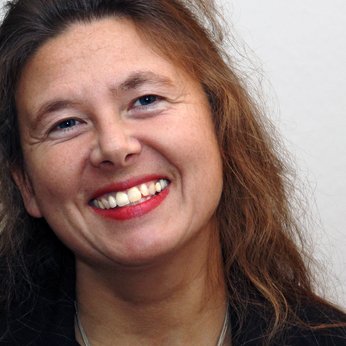
Empowering as many people as possible to do it themselves: This is a central concern of toom. The three DIY brochures in plain language are helpful for this, and now a large section on toom.de has also been rewritten in easy-to-understand language. Dr Angelika Magiros from project partner Bundesvereinigung Lebenshilfe e.V. tells us how important these tools are for many people with and without intellectual disabilities, and what else is planned together with toom in terms of inclusion.
Toom has been committed to the integration of people with disabilities into society for many years. For example, by setting up so-called external workplaces for Lebenshilfe employees in Toom stores - these are jobs for employees with disabilities from workshops. And also in projects that are planned centrally and implemented nationwide in cooperation with the Bundesvereinigung Lebenshilfe e.V. (Federal Association of Lebenshilfe). As an overarching joint project, for example, two brochures on the topic of "DIY made easy" have already been produced in plain language, as well as a third brochure in the series on the topic of climate and nature conservation.
In a further step, a large section on toom.de has now also been rewritten in plain language, making it easy to understand.
What does "plain language" mean for society? Why do so many people benefit from it? And why is toom in particular, as a DIY chain, a committed - and ideally suited - pioneer? We asked a woman who should know: Angelika Magiros from project partner Bundesvereinigung Lebenshilfe e.V.. Angelika Magiros
one: Mrs Magiros, how important is the topic of "easy language" - for Lebenshilfe, but above all for society?
Angelika Magiros
one: Mrs Magiros, how important is the topic of "easy language" - for Lebenshilfe, but above all for society?
Angelika Magiros: Plain language is hugely important - in the work of Lebenshilfe, but of course above all for the people it helps in their everyday lives. Plain language is a means of enabling people with intellectual disabilities to exercise their legal right to inform themselves - without barriers, without helpers who have to "translate" complicated texts. Independent access to information is a human right for us. Easy-to-read language is a great tool for this.
one: What exactly is plain language - and who defines it?
Angelika Magiros: Among other things, the Netzwerk Leichte Sprache has developed rules for plain language.
These rules are, for example: short sentences, only one piece of information per sentence, foreign words and technical terms are replaced or explained. It is also very important that every plain language text must be checked by people with intellectual disabilities. There is also plain language, which also makes it easier for people to understand texts. However, it does not follow a fixed set of rules and is therefore sometimes too difficult to understand.
one: So there really is plain language for everyone?
Angelika Magiros: It's individual, of course: not everyone always understands everything. But we have already ensured that a whole range of people who would otherwise not be able to get any further with everyday language are able to obtain information.
one: How do you check whether plain language is actually understood?
Angelika Magiros: First of all, we try to implement all the rules of plain language. It is very important to us that people with intellectual disabilities always check whether the wording is really understandable. That is a quality criterion. This is standard for us, also in our cooperation with toom.
We submit the texts to a whole group of reviewers: A team of people with intellectual disabilities. Young, old, as diverse as possible. There are now many so-called "easy language offices" that can be engaged for the purpose of translating texts. Most of them also work with such groups of translators.
one: Why is toom such a good partner for the project?
Angelika Magiros: We think it's extremely important that plain language finds its way into all kinds of areas of life. This also includes DIY craft topics: How do I paint a wall? How can I install a shelf? The three brochures that toom has now published are a great thing! Think, for example, of the many people, some of whom have mental disabilities, who live in outpatient, assisted living: with the help of these booklets, they can simply do things themselves step by step.
And ultimately, this commitment also fits in very well with the toom claim "Respect for those who do it themselves". And also to the fact that the target group for easy-to-read is huge.
„Easy-to-read language is used by around 13 million people with intellectual disabilities in Germany.“
one: What do you mean by "the target group for plain language is huge"?
Angelika Magiros: Easy-to-read language is needed by around 13 million people with intellectual disabilities in Germany. And I have learnt that: Many people without disabilities also use the brochures because they are written so wonderfully simply. Everything is explained clearly and step by step, and visualised with lots of photos.
That gets to the heart of the matter. Of course, we at Lebenshilfe are primarily concerned with people with intellectual disabilities. But this simple language is also good and important for other people: for example, for people who are just learning German. Or people who have difficulty reading. These are also target groups!
one: How did your collaboration with toom come about?
Angelika Magiros: We have been working with toom for almost ten years. We started with local projects. A very important commitment was - and still is - the external workshop workplaces and internships in the toom stores. The response has been great: where outdoor workstations have been installed, everyone has always been very enthusiastic. Even the toom employees. We have often received feedback that team spirit and customer contact have been positively reinforced.
one: What are your hopes for the future for the collaboration with toom and beyond?
Angelika Magiros: In general, I would like to see even more local partnerships. More participation in working life, even more external workshop jobs, but also more regular jobs subject to social insurance contributions for people with disabilities. And I believe that we will also come up with a lot more on the subject of "plain language". Of course, it would be great if plain language became more and more commonplace - but there is still a long way to go.
